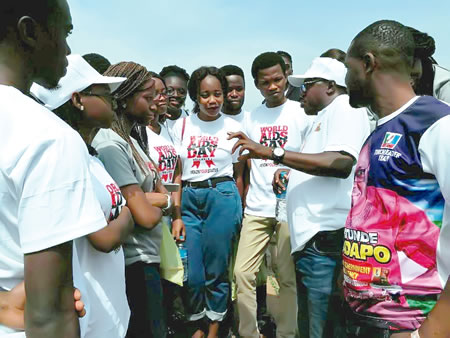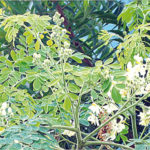
Youths and adolescents are the ones most hit by the Human Immuned Deficiency Virus (HIV). In this report by Sade Oguntola, experts say youths need not fear getting tested for HIV, as its treatment is free and a means to curb the spread of the virus globally.
THE stadium was agog with music, with people dancing to melodious tunes from loud speakers after a long walk to create awareness on HIV and the need for everyone to get tested for HIV.
With flyers around talking about HIV, the music interspersed with riddles and jokes from the master of ceremony. Youths, including University of Ibadan Medical students, came in droves to participate in the HIV testing and mega jam at the Adamasingba Stadium to mark the World AIDS Day in Ibadan.
Understanding the drama over Kwara South Senatorial ticket
”It is a nice initiative to help people understand what HIV is and that people living with the virus should not be stigmatised. People need to know their HIV status; they need to get tested to reduce the number of people having HIV in our society,” said Miss Olanike Zainab Alabi, Miss Oyo State 2017/2018.
The beauty queen, wearing a white shirt, with “know your HIV status” inscribed on its back, with a beaming smile said youths need not avoid HIV testing.
“The fact that you have HIV does not mean that you cannot live like a normal person. You can live like a normal person as long as you use your drugs adequately,” she added.
Miss Alabi had her HIV test done a month ago, and like every individual, she experienced some fear in case the result comes out positive.
“I was scared because there are various ways a person can contract HIV. As a female, there is a high possibility of catching the disease because we go to the salon to make our hair.
”I said oh my God, I hope someone has not used an infected needle on me. I felt so scared; but in the end, when I got the result, I was glad that I am free.”
Miss Alabi said it is important that youths are aware of their status to ensure that they do not go ahead to infect other people have children, if they so desire, that are HIV-free and ensure that they continue to protect themselves from getting infected.
UNAIDS report on the global AIDS epidemic 2013 report indicates that half of the 3.1 million Nigerians living with HIV are adolescents and young people aged between 15 and 24 years. Also, Nigeria has the second highest global burden of HIV. Ten per cent of the global population of adolescents living with HIV live in Nigeria.
Little wonder, the University of Ibadan Medical Student Association was not left out of the celebration. The youths, in their grey T-shirt and a banner with ‘Rock the Ribbon’ also added their voices, as future healthcare providers in the country.

“We are a key in the control of HIV/AIDS. We believe that an HIV-free world is possible since we know the drug to use to reduce the chances of its spreading,” said Miss Adenike Adejuwon, vice president, University of Ibadan Medical Students Association.
Adejuwon added: “This outreach is to let people, including youths, know what HIV is all about. Even if they have HIV, it is treatable. They can live as long as they want to, so long they are use their drugs appropriately and do not give chance for resistance.”
Paradoxically, Damilare Desmond, also with his red T-shirt with the inscription ‘Play safe’ said adopting youth-centred activities, including music and dance, had proved effective in ensuring youth can easily walk in for testing.
Enjoying the lyrics of the music with his other friends at the stadium, Desmond stated “Most times, people really do not want to come out, but when they hear music or that an artiste is coming, it draws more people out. For youths, music attracts even more than film show.”
Executive secretary, Oyo State Agency for the Control of AIDS, Mr Obatunde Oladapo, said people can only know their HIV status by testing.
According to him, “if everyone knows their HIV status, then every person that is HIV-negative will be encouraged to ensure that they do not have HIV.”
He said even those that test positive for HIV will also have the opportunity of being linked with HIV treatment to ensure that they keep their virus in check and attain what is called undetectable viral load.
A person with an undetectable viral load cannot infect other people with HIV and a pregnant woman with undetectable HIV viral load stands a zero risk of passing on the virus to her baby.
Mr Oladapo said that there is no alternative to HIV testing to know one’s HIV status, adding that it is the right and duty of everyone in the society to know their HIV status.
“It is what we all need to protect ourselves and others from getting infected, and that is why we are urging everyone to know their HIV status. This will make our goal of ending AIDS in the society attainable,” he said.
Ironically, he said the fight to stop AIDS cannot be won without the full involvement of youths and they’re taking the lead in the fight.
According to him, “youths are more affected by HIV. It is our generation that brought AIDS into the world; they should be the end of AIDS. They are leaders in their own right. And if the world wants to end AIDS, they have to work with the young ones.”
Moreover, Mr Oladapo said like people proudly wear red ribbons for breast cancer awareness, people should also proudly talk about HIV as the world celebrates World AIDS Day.
“The key to defeating stigma is being proudly HIV-positive and positively affecting other people to test. If you cannot rock your HIV status, how do you encourage others to know theirs? So it is very important.
“But this is only possible when you are well informed; take treatment and remain strong, and act like every other person. That is the essence of people testing, getting information, getting treatment and living their lives positively,” Oladapo said.
Dr Olubunmi Ayinde, AIDS programme coordinator, Oyo State Ministry of Health, said that Oyo State has 21 HIV treatment centres where people that test HIV-positive have access to free drugs.
She declared that HIV test takes less than 10 minutes, and that the use of antiretroviral treatment is also a form of HIV prevention, aside from abstinence, being faithful to one partner and using condom always and correctly for every sexual intercourse.





